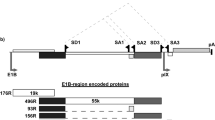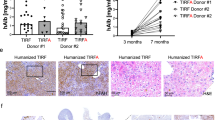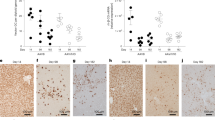Abstract
Clinical applications of tumor gene therapy require tumor-specific delivery or expression of therapeutic genes in order to maximize the oncolytic index and minimize side effects1,2. This study demonstrates activation of transgene expression exclusively in hepatic metastases after systemic application of a modified first-generation (E1A/E1B-deleted) adenovirus vector (AdE1−) in mouse tumor models. The discrimination between tumors and normal liver tissue is based on selective DNA replication of AdE1− vectors in tumor cells. This new AdE1− based vector system uses homologous recombination between inverted repeats to mediate precise rearrangements within the viral genome. As a result of these rearrangements, a promoter is brought into conjunction with a reporter gene creating a functional expression cassette. Genomic rearrangements are dependent upon viral DNA replication, which in turn occurs specifically in tumor cells. In a mouse tumor model with liver metastases derived from human tumor cells, a single systemic administration of replication activated AdE1− vectors achieved transgene expression in every metastasis, whereas no extra-tumoral transgene induction was observed. Here we provide a new concept for tumor-specific gene expression that is also applicable for other conditionally replicating adenovirus vectors.
This is a preview of subscription content, access via your institution
Access options
Subscribe to this journal
Receive 12 print issues and online access
$209.00 per year
only $17.42 per issue
Buy this article
- Purchase on Springer Link
- Instant access to full article PDF
Prices may be subject to local taxes which are calculated during checkout



Similar content being viewed by others
References
Dachs, G.U., Dougherty, G.J., Stratford, I.J. & Chaplin, D.J. Targeting gene therapy to cancer: a review. Oncol. Res. 9, 313–325 (1997).
Alemany, R., Balague, C. & Curiel, D.T. Replicative adenoviruses for cancer therapy. Nature Biotechnol. 18, 723–727 (2000).
Nelson, J.E. & Kay, M.A. Persistence of recombinant adenovirus in vivo is not dependent on vector DNA replication. J. Virol. 71, 8902–8907 (1997).
Sullivan, D.E. et al. Liver-directed gene transfer in non-human primates. Hum. Gene Ther. 8, 1195–1206 (1997).
Steinwaerder, D.S., Carlson, C.A. & Lieber, A. DNA replication of first-generation adenovirus vectors in tumor cells. Hum. Gene Ther. 11, 1933–1948 (2000).
Steinwaerder, D.S., Carlson, C.A. & Lieber, A. Generation of adenovirus vectors devoid of all viral genes by recombination between inverted repeats. J. Virol. 73, 9303–9313 (1999).
Sussenbach, J.S. & van der Vliet, P.C. Studies on the mechanism of repliction of adenovirus DNA. I. The effect of hydroxyurea. Virology 54, 299–303 (1973).
Stratford-Perricaudet, L.D., Makeh, I., Perricaudet, M. & Briand, P. Widespread long-term gene transfer to mouse skeletal muscles and heart. J. Clin. Invest. 90, 626–630 (1992).
Steinwaerder, D.S. & Lieber, A. Insulation from viral transcriptional regulatory elements impoves inducible transgene expression from adenovirus vectors in vitro and in vivo. Gene Therapy 7, 556–567 (2000).
Hanahan, D. & Weinberg, R.A. The hallmarks of cancer. Cell 100, 57–70 (2000).
Yoon, S.S. et al. An oncolytic herpes simplex virus type 1 selectively destroys diffuse liver metastases from colon carcinoma. FASEB J. 14, 301–311 (2000).
Haag, A. et al. Highly efficient transduction and expression of cytokine genes in human tumor cells by means of autonomous parvovirus vectors; generation of antitumor responses in recipient mice. Hum. Gene Ther. 11, 597–609 (2000).
Coffey, M.C., Strong, J.E., Forsyth, P.A. & Lee, P.W. Reovirus therapy of tumors with activated Ras pathway. Science 282, 1332–1334 (1998).
Zhang, W.W. Development and application of adenoviral vectors for gene therapy of cancer. Cancer Gene Ther. 6, 113–138 (1999).
Babiss, L.E., Friedman, J.M. & Darnell, J.E. Jr. Cellular promoters incorporated into the adenovirus genome: effects of viral regulatory elements on transcription rates and cell specificity of albumin and beta-globin promoters. Mol. Cell Biol. 6, 3798–3806 (1986).
Heise, C. et al. ONYX-015, an E1B gene-attenuated adenovirus, causes tumor-specific cytolysis and antitumoral efficacy that can be augmented by standard chemotherapeutic agents. Nature Med. 3, 639–645 (1997).
Heise, C. et al. An adenovirus E1A mutant that demonstrates potent and selective systemic anti-tumoral efficacy. Nature Med. 6, 1134–1139 (2000).
Doronin, K. et al. Tumor-specific, replication-competent adenovirus vectors overexpressing the adenovirus death protein. J. Virol. 74, 6147–6155 (2000).
Hallenbeck, P.L. et al. A novel tumor-specific replication-restricted adenoviral vector for gene therapy of hepatocellular carcinoma. Hum. Gene Ther. 10, 1721–1733 (1999).
Vrancken Peeters, M.-J., Lieber, A., Perkins, J. & Kay, M.A. Method for multiple portal vein infusions in mice: Quantification of adenovirus mediated hepatic gene transfer. Biotechniques 20, 278–285 (1996).
Lieber, A., He, C.Y., Kirillova, I. & Kay, M.A. Recombinant adenoviruses with large deletions generated by Cre-mediated excision exhibit different biological properties compared with first- generation vectors in vitro and in vivo. J. Virol. 70, 8944–8960 (1996).
Satoh, J. & Kim, S.U. Cytokines and growth factors induce HSP27 phosphorylation in human astrocytes. J. Neuropathol. Exp. Neurol. 54, 504–512 (1995).
Shayakhmetov, D.M., Papayannopoulou, T., Stamatoyannopoulos, G. & Lieber, A. Efficient gene transfer into human CD34+ cells by a retargeted adenovirus vector. J. Virol. 74, 2567–2583 (2000).
Russell, D.W., Alexander, I.E. & Miller, A.D. DNA synthesis and topoisomerase inhibitors increase transduction by adeno-associated virus vectors. Proc. Natl. Acad. Sci. USA 92, 5719–5723 (1995).
Liu, M.L., Mars, W.M., Zarnegar, R. & Michalopoulos, G.K. Collagenase pretreatment and the mitogenic effects of hepatocyte growth factor and transforming growth factor-alpha in adult rat liver. Hepatology 19, 1521–1527 (1994).
Acknowledgements
We thank D. Russell and T. Moeller for primary human cells and M. Steinwaerder for technical assistance and help with digital images. This work was supported by a grant from the Cystic Fibrosis Foundation and by Grant R01 CA80192 from the National Cancer Institute of the National Institutes of Health.
Author information
Authors and Affiliations
Corresponding author
Rights and permissions
About this article
Cite this article
Steinwaerder, D., Carlson, C., Otto, D. et al. Tumor-specific gene expression in hepatic metastases by a replication-activated adenovirus vector. Nat Med 7, 240–243 (2001). https://doi.org/10.1038/84696
Received:
Accepted:
Issue Date:
DOI: https://doi.org/10.1038/84696
This article is cited by
-
Enhancement of CPT-11 antitumor activity by adenovirus-mediated expression of β–glucuronidase in tumors
Cancer Gene Therapy (2011)
-
Adenovirus-mediated intratumoral expression of immunostimulatory proteins in combination with systemic Treg inactivation induces tumor-destructive immune responses in mouse models
Cancer Gene Therapy (2011)
-
Antitumor activity of Ad-IU2, a prostate-specific replication-competent adenovirus encoding the apoptosis inducer, TRAIL
Cancer Gene Therapy (2010)
-
Gene expression in intrahepatic tumors through DNA recombination by a replication-activated adenovirus vector
Cancer Gene Therapy (2004)
-
Progress and problems with the use of viral vectors for gene therapy
Nature Reviews Genetics (2003)



